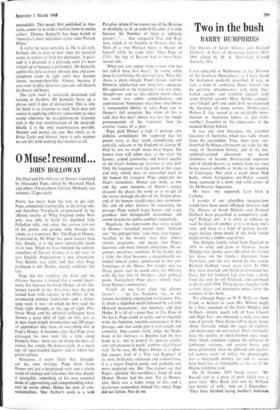0 Muse ! resound ...
JOHN HOLLOWAY
The Iliad and The Odyssey of Homer, translated by Alexander Pope, edited by Maynard Mack and others (Twickenham Edition, Methuen, two volumes, 12 gns each) Poetry has never been the way to get rich. Pope, committed irretrievably to the losing side, and therefore `Un-plac'd, un-pension'd' in the affluent society of Whig England under Wal- pole, was able to build his dignified little Palladian villa, and enjoy the curiosa felicitas of his grotto and garden, only through his talents as a translator. But 'The Iliad of Homer, Translated by Mr Pope' has more interest than that. Simply, it is the most remarkable poem of its time. When we have finished the conven- tionalities of literary history, it is left over to give English Augustanism a new dimension. That Bentley was right; and that what Pope produced is not Homer, merely confirms this fact.
Pope did not translate the Iliad and the Odyssey because it looked like a sound invest- ment, but because he loved Homer all his life. Spence records in the Anecdotes how the poet looked back with rapture, in his fifties, to the seventeenth century translation—and a home- spun work it was—in which he first read the Iliad, right through, at the age of eight. Pro- fessor Mack and his editorial colleagues have thrown a great deal of light on this, just as in their book-length introduction and 200 pages of appendices they have on everything else in Pope's Homer. It becomes clear that Pope even envisaged his own later life a little along Homeric lines: there was no biting the dust, of course, but simply the preservation, in a mean age, of open-handed dignity and a robust but genial culture.
Moreover, it seems likely that, through- out his own writings, Pope drew from Homer not just a heightened style and a whole realm of analogy and reference, but also, deeply if intangibly, something of his own essential mode of approaching and comprehending what- ever he wrote about. Hence the rout of con- ventionalities. 'Our Author's work is a wild Para.dise, where if we cannot see all the Beauties so distinctly as in an order'd Garden, it is only because the Number of them is infinitely greater';. that unequal'd Fire and Rap- ture, which is so forcible in Homer, that no Man of a true Poetical Spirit is Master of himself while he reads him.' Thus Pope in 1715: the Age of Reason had its more-than- reason side.
'What can you expect from a man who has not talk'd these five days?.' he wrote, while deep in translating, the previous year. What this shows is plain enough. Pope's Greek, and his Homeric scholarship too, were very adequate. His approach to the translator's task was long- thought-out; and (as this edition makes clear) the result was subtle, comprehensive and sophisticated. Sometimes what looks like liberty is unexampled fidelity to what Pope saw as Homer's full intention. But when all this is said, that five days' silence was less the simple preoccupation of the translator than the creative trance of a poet.
Pope paid Homer a high if perhaps also dubious compliment. He supposed that his poems were, as they stood, immediately and centrally relevant to the England of George 11. Had he not, he might never have begun. The honest man will admit that, at the start, the heroics, armed gymnastics and brutal squalor of the Iliad's bronze-age warriors is very dull. Only the language saves the poem at this stage, and only slowly does its unrivalled myth of the human lot transpire. Pope amputates the Iliad's extremities. Homer can think, at one and the same moment, of Hector's corpse dragged (he places the word so as to get all the stress) through the dirt of the Trojan plain, and of the human steadfastness that surmounts this and all other horrors. In translating the passage, Pope turned tragic horror and tragic grandeur into disreputable misconduct, and sound maxim for public conduct respectively.
Regularly, the expressions that carry weight in Homer—`wretched mortal men,' beloved son,' the god quit him,"you, once, were happy,' 'terrified at the bronze'—lose their almost sinister pregnancy, and merge into Pope's decorous and more limited animations. He or- ganises, moralises, socialises. In his hands, just a little, the Iliad becomes a magnificently ex- tended funeral games, punctuated by fine per- formances in the House. No wonder that (as Mack points out) he could close his Odyssey with the last line of Dryden's chief political poem. Everywhere Pope draws silently back from Homer's immensities.
'Could all our Care elude the gloomy Grave? . . .' he has Sarpedon say, in his famous battlefield exhortation to Glaucon. This is about a dignified death followed by a Castle Howard mausoleum : not butchery and then Hades. It is all of a piece that, in The Rape of the Lock, Pope could so easily and so elegantly write the feminine, socialite counterpart of that passage, and also could give it real weight and authority. One cannot fairly judge the Hades book in his Odyssey, as Broome had the first hand in it: but in general its 'pensive youths, and soft-enamour'd maids' confirm what I have said. To be sure, Mr Pope's Homer is a splen- did success. Full of a 'Fire and Rapture' of its own, brilliantly animated and authoritative, it is a major English poem, and probably our most neglected one. But. One cannot say that Pope's splendid this-worldliness fitted ill with Homer. Homer had his own. Yet in Homer, also, there was a wider range of life, and a mysterium tremendum behind life, where Pope did not follow. Nor do we.


































 Previous page
Previous page